Explaining Postmodernism:
Skepticism and Socialism from Rousseau to Foucault
By Stephen R. C. Hicks
Professor of Philosophy
English editions:

First edition: two hardcover and eight softcover printings from 2004-2010 by Scholargy Publishing. First edition Kindle e-book published 2010.
Expanded hardcover edition published in 2011 by Ockham’s Razor. Kindle expanded edition published in 2011.
Audiobook edition narrated by Scott R. Smith at Audible or iTunes. Audiobook edition narrated by me at YouTube.
Australia and New Zealand edition (Connor Court Publishing, 2019).
Paperback edition, 2023.
Translations:
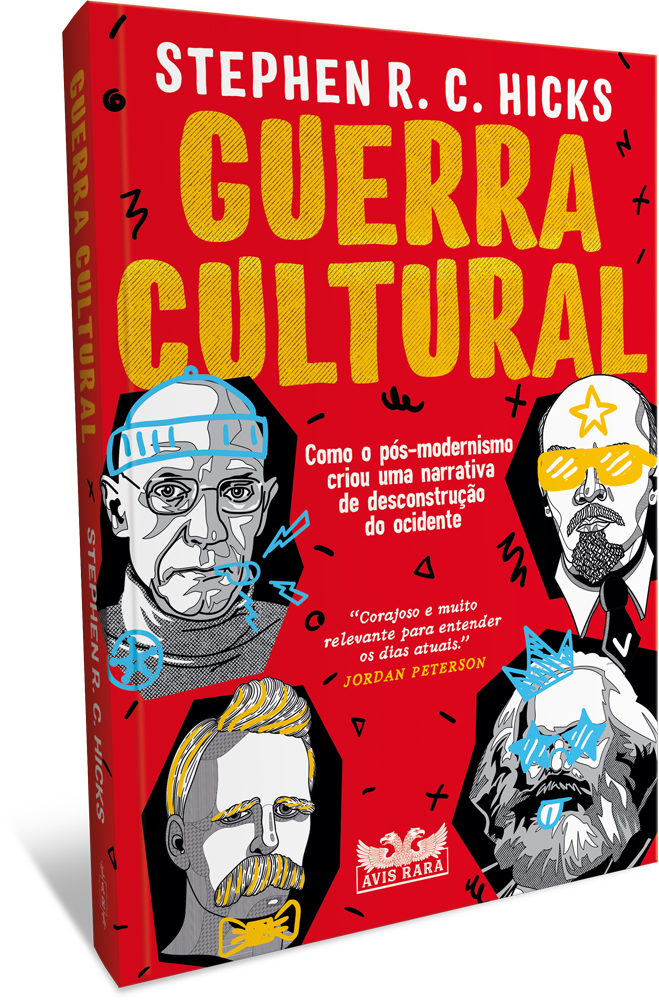
Portuguese translation. Second edition published by Faro Editorial, São Paulo, Brazil, 2021. First edition published by Callis Editora (São Paulo, Brazil, 2011).
Persian translation by H.P. Safir, Khatereh Zohrabi, and Farzaneh Ehsani published by Qoqnoos Publishing (Tehran, Iran, 2013). [Sample pages.] [Also this second translation into Farsi.]
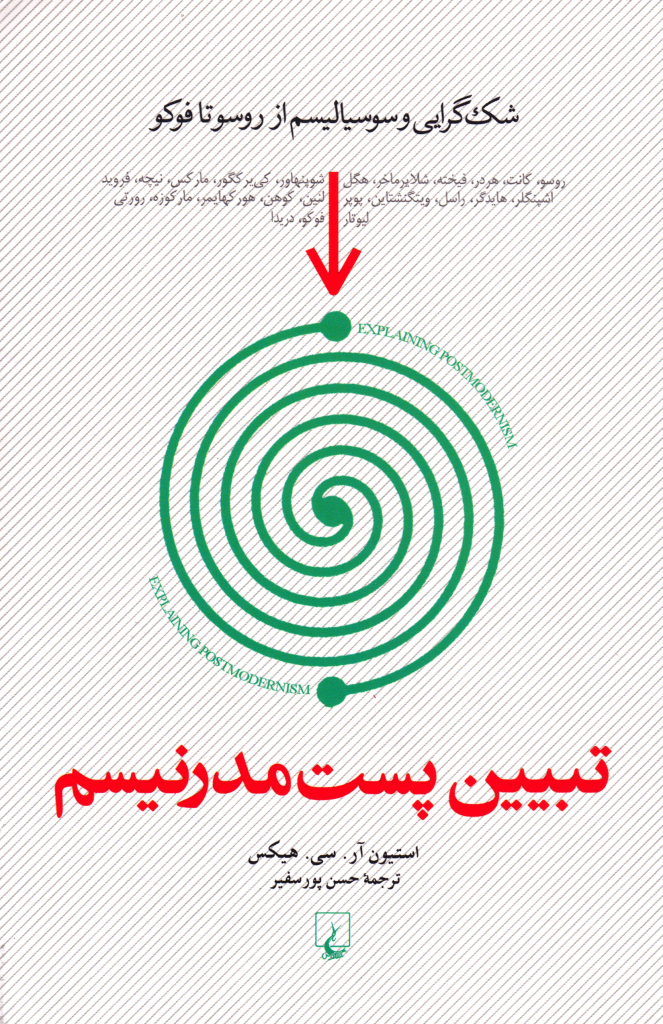
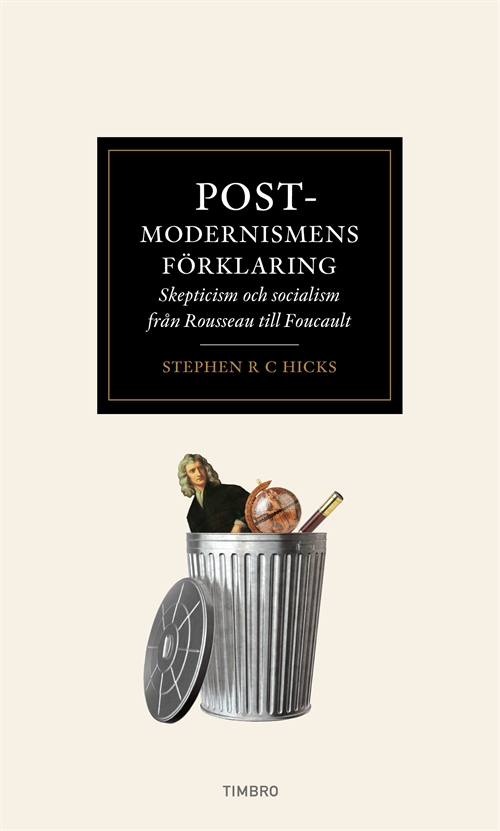
Swedish translation published by Timbro (Stockholm, Sweden, 2014).
Spanish translation published by Barbarroja Ediciones (Buenos Aires, Argentina, 2015).
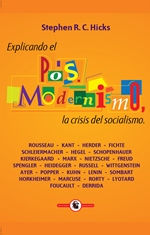
Serbian translation of Chapter One by Alma Causevic (2012).

Polish translation by Piotr Kostyło and Katarzyna Nowak published by University of Kasimir the Great Press (Bydgoszcz, Poland, 2016).
Arabic translation published by Ayoub Salhi and Anouar Elmekki (2020).


Hebrew translation published by Sella-Meir Press (Tel Aviv, Israel, 2020).
Russian translation published by RIPOL Classic Publishing (Moscow, Russia, 2021).
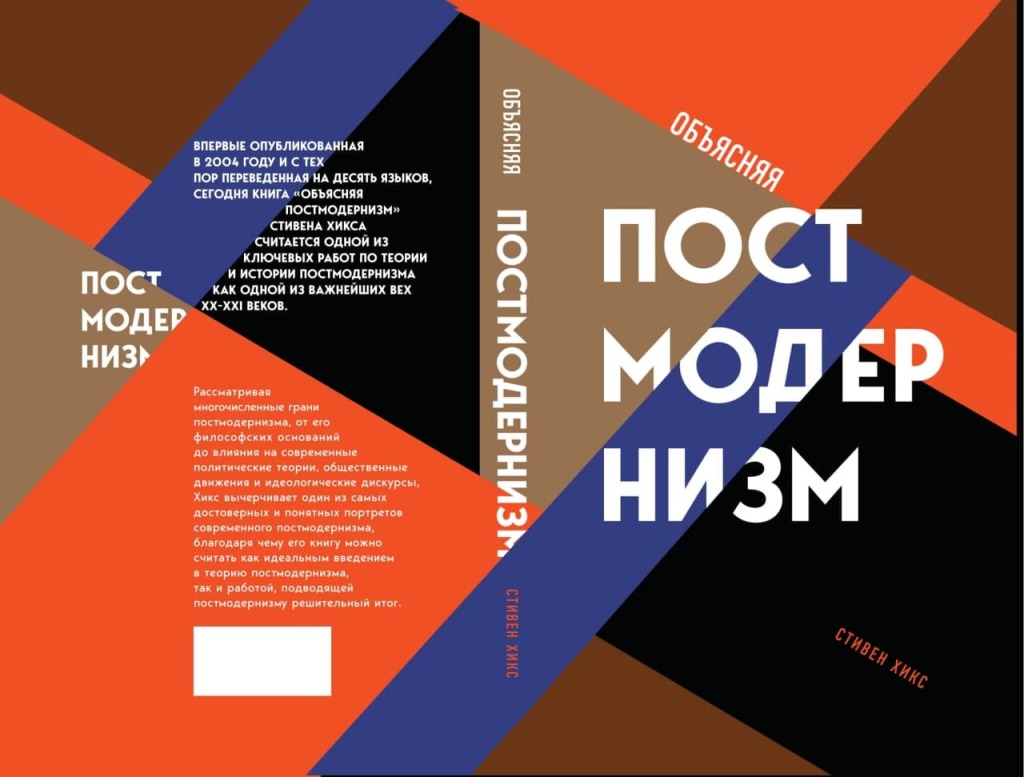

Urdu translation published by Educational Publishing House (New Delhi, India, 2023).
Estonian translation published by Postimees Kirjastus (Tallinn, Estonia, 2024).

Forthcoming: Turkish translation, by Kitap Publishing, Istanbul, 2025. Pakistani edition, by Aks Publications, Lahore, 2025. Hindi translation, by Kumar Dipanshu (forthcoming 2026).
The First Edition text:
Explaining Postmodernism: Skepticism and Socialism from Rousseau to Foucault [pdf].
The Chapters and Sections:
Frontmatter [pdf]
Table of Contents [pdf]
Chapter One: What Postmodernism Is [pdf] [mp3] [YouTube]
Chapter Two: The Counter-Enlightenment Attack on Reason [pdf] [mp3] [YouTube]
Chapter Three: The Twentieth-Century Collapse of Reason [pdf] [mp3] [YouTube]
Chapter Four: The Climate of Collectivism [pdf] [mp3] [YouTube]
Chapter Five: The Crisis of Socialism [pdf] [mp3] [YouTube]
Chapter Six: Postmodern Strategy [pdf] [mp3] [YouTube]
Bibliography [pdf] [html]
Index [pdf]
Acknowledgments [pdf]
The Tables and Charts:
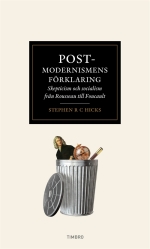
Chart 1.1: Defining Pre-modernism and Modernism
Chart 1.2: The Enlightenment Vision [pdf]
Chart 1.3: Defining Pre-modernism, Modernism, and Postmodernism
Chart 5.1: Marxism on the Logic of Capitalism
Chart 5.2: Total Livestock in the Soviet Union
Chart 5.3: Gross Physical Output for Selected Food Items
Chart 5.4: Deaths from Democide Compared to Deaths from International War, 1900-1987
Chart 5.5: Left Terrorist Groups’ Founding Dates
Chart 5.6: The Evolution of Socialist Strategies [gif]
Detailed Table of Contents.
The Scholarly Reviews:
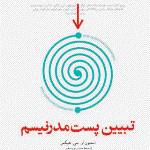
Professor Curtis Hancock in The Review of Metaphysics (and can be read online here).
Professor Gary Jason in Liberty (also online here.)
Professor Marcus Verhaegh in The Independent Review.
Dr. David Gordon in The Mises Review.
Professor Max Hocutt in The Journal of Ayn Rand Studies.
Professor Edvard Lorkovic in Philosophy in Review.
Professor Steven M. Sanders in Reason Papers.
Professor Mistaken (pseudonym) in Uncouth Opinions.
Professor Tibor Machan in Deseret News. Reposted here.

Erratum:
Page 2, sourcing of Foucault quotation: These are Professor Todd May’s paraphrasing words, not Foucault’s.
.

.
.
.

Return to the StephenHicks.org main page.

Dr. Hicks,
This book is by far the most helpful resource I have ever come across for understanding why the world is turning to a direction that I cannot comprehend. In fact I would say this is the most influential book I have ever read and yet you offer it up for free. Incredible. There are so few philosophers in academia that defend rationality, you really are noble in your effort to promote reason. You are a revitalizing and refreshing in your content and efficient and eloquent in your presentation. Thank you so much! I can’t wait to read the rest of your works and greatly look forward to your future publications.
The purpose of my email is to ask you if there is any way I can purchase a signed copy of your book “Explaining Postmodernism”? I plan on homeschooling my two boys, and when they come of age, this book will be on the mandatory reading list. Because this book so clearly states the philosophies that lead up to the postmodernist movement and accurately exposes the true nature of the irrationality, I am able to teach my children to identify irrational concepts and teach them to avoid the logical pitfalls of postmodern philosophy.
Thank you again. I am not a philosopher, and I am not even close to your level in any regard. I am only 27 and have not yet started college, so my compliments may seem empty… But I do think deeply about life and I seek to find the truth to understand ethical concepts and to understand the nature of existence and I truly value the ability to have access to your ideas.
VR
Randall Weekes
Thank you, Randall. Sorry not to have responded earlier.
Dear Dr Hicks,
I read your book on postmodernism and I was very impressed by it! This is an exceptionally good book that is written with great insight and clarity. It is great achievement considering the amount of material and also the opaque writing style / thought processes of most postmodernists that are being discussed. Your book should be a compulsory reading to every university student in the western world, especially the humanities and social sciences departments. All the best and keep up the good work!
Kind regards,
Simon
Thank you, Simon! I appreciate the praise.
Dear Dr Hicks,
Just finished this book, and am reading it again. I appreciate your clear and direct writing style. But it ends without defending reason! I think Steven Pinker is working on a book that defends the enlightenment project. Regardless, if you haven’t joined the heterodox academy, then consider doing so.
Thanks for the praise, Aaron. I respect Pinker’s work very much, and last year I joined Heterodox.
Dear Professor Hicks,
Considering the collegiate landscape and political alignment, is your peer review only to be considered “peer reviewed” by the postmodern neomarxist establishment? How on earth could an intellectual foothold be achieved at all?
Sincerely, a young man concerned for the future.
Hi Aaron: There are many outlets, academic and otherwise, for good intellectual work. So the fact that most postmodernist journals are sealed off from outside engagement, so to speak, is a minor problem. Generating quality content and marketing it effectively, that is the best focus of one’s efforts.
I can’t find “explaining postmodernism for less than $100 for a used paperback or $350 for hardback. Where can I find this book for a normal price?
Hi Jonathan: A new printing will be out this summer. Now it is available at Amazon on Kindle or audiobook at YouTube. Thanks for your interest.
Hi Stephen,
I was drawn to your book by Jordan B Peterson, during the beginning of his speech and the Manning Centre. I was looking at purchasing a copy of your book but to no avail in a reasonable price point. I am glad to hear that the book is being printed this summer and I would be very excited to see that come to fruition. We are currently living in difficult times and I am on a journey for information so that I may sort out the world around me.
Again, glad to hear that there is a printing coming soon. Perhaps you could give us an idea on the best place to purchase your book or to watch for the new prints to come out.
Thanks again and look forward to your book.
Cheers,
Matt R
Thanks for your interest, Matt. I will mention here when the new printing is available for sure. Also Amazon will then update its status. If you’re a Kindle person, that edition is available now.
A used hardcover for this book
https://www.amazon.com/gp/offer-listing/1592476465/ref=tmm_hrd_used_olp_0?ie=UTF8&condition=used&qid=1498150146&sr=8-1
$10,000.00
+ $3.99 shipping
Used – Good
Arrives between June 29 – July 17.
Ships from TX, United States.
Shipping rates and return policy.
Wisepenny
5 out of 5 stars 97% positive over the past 12 months. (13,584 total ratings)
Yes, surprisingly. A new printing will be out this summer. Now it is available at Amazon on Kindle or Audiobook at YouTube. Thanks for your interest.
Very well written, very informative and very well structured apology to capitalism, with surface view on Hegel and dismissal of his dialectics. Could be very useful for cementing young readers mind on the idea that socialism has failed.
Dear Mr. Hicks,
my name is Tom Amarque, I am a German writer, philosopher and podcaster. I would like to to invite you to be my guest on my podcast ‘Lateral Conversations’ and talk to you an hour or so about postmodernism. I think your perspective is very much needed in this time, and since this is a very complicated topic it could help to provide a more sophisticated view on this issue.
With best wishes,
Tom Amarque
http://www.tom-amarque.de/lateralconversations/
Hi Dr. Hicks,
Would you happen to have an update on the timing of when Explaining Postmodernism will be back in print? Definitely looking forward to getting a hard copy!
Thanks and regards,
Brian
HI Brian. I’ve heard it will be back in stock at Amazon by the 20s of July. Hope that’s accurate.
Dear Dr. Hicks
This has been the best book I have ever read. Your writing style is very down to earth. I listened to it on audio and read it on the kindle. This has helped me become a more informed and more aware of what goes on around me. It as rekindled a passion for philosophy. I would love to read anything else you have. I finished Nietzsche and the Nazis and your pamphlet postmodernism and free speech. If you have anything else, I would love to hear it or what I should explore next.
Thank you for the high praise, Matt!
Dear Dr. Hicks,
I found “Explaning Postmodernism” to be very informative as well as extremely clear. I would like to expand my knowledge base of the work and ideas produced by the major thinkers of the postmodern movement. Are there any particular books you could recommend to me that would result in a greater yield than simply reading primary source Derrida, Foucault, etc.? Or do I need to just wade into the long-winded and often professionally abstruse primary works themselves…
Thanks for your time!
Thanks for the praise, Ryan. For discussion of pomo in applied areas, I recommend these four books: http://www.stephenhicks.org/2014/09/16/four-recommended-books-on-postmodernism/. For serious history-of-ideas scholarship, getting into the primary sources will be necessary.
Where can one purchase a (reasonably priced) copy of your
Explaining Postmodernism; EXPANDED EDITION?
(My search so far has uncovered only the earlier edition,
at Amazon–for $500.00!)
Thanks–much appreciated.
Mark B.
Mark Brandrud
Thanks for your interest, Mark. A new printing will be out later this month and at Amazon at the normal price. Now it is only available on Kindle or Audiobook at YouTube. If you email my publisher (ockhamsrazormedia@gmail), I’m sure they’ll be happy to send you print copies once the new printing arrives. Best, Stephen
Dear Stephen,
I’m producing a film on postmodernism. We will also be covering language deconstruction and ideological Fascism among other topics. I already have an interview with Gene Edward Veith and some others. Would you be interested in participating by way of a video interview? Please email me (notice unique spelling): elliottnesch@gmail.com
Thanks.
Amazon is sold out…the site says they got the books in today (hardcover) but they’re already gone.
Dr Hicks, I think that says something for your work. You’ve graciously provided us a PDF, a full audiobook, a chapter by chapter audiobook, and even smaller segments. All free of charge. Now your book sells out hours after arriving, despite all those resources you’ve made available. Personally I’m looking forward to getting my hard copy so I can use a highlighter and write notes in the margins!
Wow, thanks for letting me know, Tim. I’m sure with the new printing that they’ll be in stock again very soon.
Dr Hicks, any idea when these will be back in stock? I loved the audiobook but nothing beats the written word.
I know the new printing is in Amazon’s warehouse, so they should be available any time. Another option is to buy direct from the publisher (OckhamsRazorMedia@Gmail.com). Thanks for your follow up!
I’ve just ordered my copy for shipping to the UK direct from the publisher. Ron provided me with seamless service. Paid via PayPal. Looking forward to it arriving.
If you have problems with Amazon suggest you try the same.
Hi Dr. Hicks – I finally got my hard copy of Explaining Postmodernism and read through it in a couple of days. I couldn’t put it down! I have been trying to wrap my head around what is going on in Universities and society at large, and the case you laid out helped tremendously!! One question I had is what can we do as fans of the Enlightenment to fight back? Can you point me to any other sources to explore?
Best regards,
Brian
Very glad it’s been useful to you, Brian.
Plenty to do to keep Enlightenment values going, mostly by each of us being experts in our own fields as well as generally educated human beings.
As for recommendations, that would really depend on what one specifically wants to pursue — philosophy, history, sciences, and so on. There’s lots of great work being done in all fields.
Marxism on the Logic of Capitalism. Marxism prediction wasn’t true for the time when existed Communists block like real competitor on West capitalism. The oligarchy was afraid from communism. Today, when communists competition for not exist anymore, Marxism prediction become valid again. That mean- Marxism predictions are not valid, when there is competition which target Oligarchy’ s power and money. And Marxism prediction is valid again, when there is not competition and oligarchs are not afraid for their money and power.We need competition. Reach people and oligarchy have to feel pressure all of the time. Old economic Marxism is not good, but I have ideas.
Is this “Serbian translation” an experiment of some kind? It seems to be just original English auto-translated to Croatian. Unreadable.
Thanks for letting me know about the quality, Hrvoje.
I’m going through your book for the third time now–fantastic!! One question: your use of “left” and “right” on the political spectrum, what criteria are you using to place something on that spectrum? Especially the use of “collective left” and “collective right”. (In my own mind: I think of collectivism on the left side and individualism on the right. But, of course, there are many versions of this spectrum.) Thanks in advance. Keep up the great work!
Third time! You’re catching up to me.
The categorization of social-political positions is first the Individualism//Collectivism difference. The questions here are: Who is the unit of analysis and value?
Second, within the category of Collectivism, there are differences of degree between “left” and “right.” Collectivist analyze and value groups primarily, and the question then is: What group is most important?
Hope that clarifies.
Prof. Hicks, Your book (and your dialogue w/ Prof. Peterson) inspired me to download a version of Kant’s COPR and try to read it. I didn’t get through 2 pages. But I am curious, as you tell the story of the development of Continental philosophy it sounds like one dubious idea after another that somehow take hold and influence people’s thinking. What is the process by which these ideas take hold? In math and science ideas are established by formal or empirical proof. Where is the proof that the world consists of (e.g.,) Will and Representation? Through what process is this assertion made persuasive?
I am reminded of a comment made to me (and probably misremembered or out of context, so apologies to its RM if I misunderstand) by my philosophy professor Ruth Marcus. I believe she said that “cogito ergo sum” was logically sound; by her omission of other assertions I took this to mean that most everything else we were reading is not logically sound. And I thank you for the insight that the Analytic philosophers study the tools of inquiry whereas the Continentals build models. In the sciences it is said that all models are wrong, but some models are useful. What use (and whose use) can the Continentals show for their models?
Prof. HIcks:
McAfee Site Advisor (anti-virus add-on used to safely browse the web) has marked your site as unsafe. Have you looked into this? You may be the victim of a trolling attack of some kind designed to discourage people from visiting your website. Be safe out there.
Thanks for the heads-up, CCMI..
I am very keen to read all your works but in my country, I believe, it’s hard to get these books. I am from Pakistan, a south Asian country. I hope they will help me solve some of my mind’s issues about postmodernism and many other theory. I appreciate all your labors you have spent to explain some crucial mental problems of man.
Thank you, Iftikhar. Urdu and English are the main languages in Pakistan? I am open to suggestions about how to make my books available there.
Postmodernism is also called “French theory”. Why is there no french translation of your book?!
Hi Stephen –
I listened to your talk w/ Dr. Peterson and it was great! I came here to redownload the PDF of Explaining Postmodernism (can’t seem to find the one I downloaded before) but it seems all the links are broken.
Thanks again for your work!
Hi John: That link has been fixed — thanks for letting me know. Here’s a shortcut: http://www.stephenhicks.org/wp-content/uploads/2017/10/Hicks-EP-Full.pdf.
Hello Stephen will your book on Postmodernism be reprinted in English soon?
Hi Michael: The next printing is supposed to be available by October 28. Thanks for asking.
How can I purchase a copy of this book Mr Hicks? Is there not a more affordable version for order? Thanks sir!
Hi Paul: The new printing should be out by the 29th, I’ve heard. Thanks for your interest. Best, Stephen
Thank you! I admire your work and love the youtube PM series. Must have book now. Thanks again.
I have searched everywhere for your book. There aren’t any available for sale for an affordable fee. How may I acquire the latest printing?
Hi Patrice: The new printing should be in stock at Amazon within a week. Thanks for your interest.
Amazon UK is offering your book for £589, is this correct?
https://www.amazon.co.uk/s/ref=nb_sb_ss_c_1_30?url=search-alias%3Daps&field-keywords=explaining+postmodernism+stephen+hicks&sprefix=explaining+postmodernism+hicks%2Caps%2C392&crid=Y9I38MCH4YQS&rh=i%3Aaps%2Ck%3Aexplaining+postmodernism+stephen+hicks
The new printing should be available any time now, and that will bring prices down to their normal range. Thanks for your interest.
Dear Dr Hicks,
Is there an article about how new atheism (Richard Dawkins, Sam Harris, Christopher Hitchens) embodies the methods of traditional skepticism, which will I always lead to Socialism?
I can see the Links, but I cannot explain it.
Henry
Hi Henry: I don’t know of an article that focuses on that, unfortunately. My sense is that atheism all by itself does not lead to any particular politics, as atheism is only the lack of a belief in gods. One can be a skeptic about religion without being a skeptic about other things, e.g., chemistry or economics. Also, even if one is a deep skeptic about everything in general, socialism is not the only politics one could then be non-rationally committed to. Hope that’s responsive to the intent of your question. Best, Stephen
Professor Hicks,
Why has post modernism had so little impact on the physical sciences, but has virtual destroyed world history, political philosophy and several other humanities? Why did the humanities collapse so readily and physics laughed them off (per Alan Sokal)?
Hi A.D. White: That’s a good, big question. An important part of it is the psychological impact of the philosophical fact/value dichotomy. The use of rational methods to discover facts has been successful, but grounding normative concepts and judgments is more difficult, and the fact/value dichotomy leads many not to try. So those disciplines that have a strong normative component drifted away from objectivity more easily. Just a start on a large topic.
Stephen,
I just discovered (via discovering JordanP) your work http://www.stephenhicks.org/wp-content/uploads/2013/12/ep-ee-2014-printing.pdf and, beyond thanking you for your great effort, wanted to share a thought that arises:
Perhaps post modernism is actually a pendulum swing from modernism back to pre modernism?
A reintroduction of original sin aka “check your privilege” and a hierarchy of micro-sized elites, imposing their control via special pleading victimhood that is actually oppressive manipulation of the individual.
Hi Fendlander. Thank you, and I agree that the same psychology that leads to anti-humanism of the premodern Original Sin position is at work in postmodern anti-humanism and demonization.
Hi Stephen,
So maybe its time to take a leaf from the SJW cookbook and repurpose the language to reflect the binary actualite ie
Modernism vs Unmodernism, whether that be pre or post, just the same backwardness and representing the same existential danger to all humanity.
Never have the basic tenets of the American Revolution been simultaneously so needed and so sorely tested IMHO.
For all his very human faults, thank goodness for President Donald J Trump the unPC and I say that imagining how much further down the Cultural Marxist rabbit hole the world would have been had he not been elected… IMHO 🙂
Dear Professor Hicks,
will there be a german edition of your book “Explaining Postmodernism”?
Kind regards!
Dear Edmund: A translator in Germany is currently seeking a publisher to underwrite the project, but I don’t know whether that initiative will be successful. I hope so. : )
Hi Stephen,
As a mathematician and teacher, I had experienced the brunt of the political war against reason, without really understanding why. Thanks to your work, I can now explain the source of years of frustration.
A week ago one night, I had an unusual dream. I woke up feeling restless and undirected. I decided to finally give your audio-book a go. It was so gripping, I spent the whole day on it – listening while driving and eating, and of course completely skipping work. While driving and listening, not only was I fascinated and inspired by what you wrote, but strangely the new roads I found myself driving down, provided a deja vu experience with my dream the night before. It was a singular day!
Anyway, there’s more. I had coincidentally been studying Rudolf Steiner’s rejection of, and alternative to Kant’s epistemology (found in ‘Truth and Knowledge’ and ‘The Philosophy of Freedom/Spiritual Activity’). I wonder what you think of that. To me Steiner’s philosophy appears to be part of what you call for in your conclusion: “What is still needed is a refutation of those historical premises, and an identification and defense of the alternatives to them.”
PS I think the title lets the book down. When I try to recommend the book to friends they all respond with “I don’t like, and am not very interested in post-modernism”. A more helpful title might be something like ‘Reducing stress and becoming more in control by understanding the craziness in the world’.
thanks again.
Thanks a lot for that reaction, Matt. Glad my book was so useful. I don’t have an informed opinion on Steiner. Your title suggestion — could be a great subtitle. I agree the current title is generic/academic
Great work!
Hi,
I translated your book into German and now I’d like to sell it as ebook. Unfortunately, the publisher doesn’t want to take it without explicit consent from your side (although, legally I do have the right to publish it). I would appreciate it a lot, if you could give me the consent. To do that and if you like to have a copy of the translation, please contact me under entropie@mail.de
Thanks a lot!
Hi Professor Hicks,
I just stumbled upon your website and couldn’t resist leaving a note to convey how much I enjoyed reading your book. It was considered “required reading” by Dr. Jordan Peterson. Your book should be required reading by all undergraduates, regardless of major.
Thank you, Chris. Happy to hear that.
sir, i read your book and it is very enjoyable for postmodern study.plz quide me whether we can say that postmodernism is an age of chaos and conflict ?if yes then can you prove it with a literary theory of postmodernism?plz quide me sir …
Professor Hicks,
Thanks for publishing your book on Amazon. Dr. Jordan Peterson, recommended your book and I was so glad to start reading it. I have always been confused about how Postmodernist/Marxist have started to get traction. Your book logically walks through the postmodernism stages with historical context. I have college age sons and I am going to make this required reading for them. They are all in the sciences/engineering so they have not been severely exposed but see some of extreme examples of post- modernism on campus. To anyone reading this, I high recommend this as fundamental must read to understand where our society is today or heading.
Thank you, Axe. Glad to know that it’s been useful to you.
Thank you for your comment, Rozman, and I’m glad the book was enjoyable. Unfortunately, I cannot follow-up with discussion of very broad questions.
Dear Dr. Hicks,
Salutations from India! I have been exploring post-modernism for a while now, given that its epistemology, as well as approaches have begun to impinge on academia all over the world. Our own neck of the woods has not been left unspoiled either, especially, if you’ve heard of it, premier Indian institutions like JNU (Delhi), and Jadavpur (West Bengal).
This is to express my profound gratitude to you for not just such a wonderful treatise on the subject that cuts through the Byzantine thicket of terminology and explains post-modern in layman’s terms. Even more laudable is your decision to make it freely available for downloads.
BTW, I have been following IDW before it was given the nomenclature by Eric Weinstein. And it was on the IDW website (I wonder if it’s official) that I found reference to you. That led me to your youtube video on post-modernism, and a google search later, here I am, on your website.
Thanks once again,
Best regards,
Ambreesh.
Thank you, Ambreesh. Very good to know it’s been useful to you. Best, Stephen
To Dr. Stephen Hicks
I have finished this excellent book, and I am profoundly grateful for the fact that you have made it available on the internet. It is obvious that an extreme amount of research was performed to write this book.
I have a question, as well as a comment, regarding Nietzsche’s philosophy, and I would be interested as well as gratified to hear your response to it:
Nietzsche often describes reason as being inferior to the instincts: why, then, does Zarathustra describe science as “courage, at last become subtle, spiritual, and intellectual, this human courage, with eagle’s pinions and serpent’s wisdom”? Moreover, in section 57 of the Antichrist, Nietzsche speaks in favor of a caste system in which those individuals “preponderating in intellectual power” are of the highest rank, and those “excelling in muscular strength” are of second rank. How would you resolve this apparent contradiction?
Comment: I do not believe that Nietzsche looked down upon Kant because in Kant the instinct to reason was too strong; rather, it seems that Nietzsche looked down upon Kant as intellectually dishonest, and therefore lacking in intellect. In section 12 of the Antichrist, Nietzsche wrote that “Kant tried to dress up a lack of intellectual conscience in scientific garb” (with reference to Kant’s concept of Practical Reason); he compares Kant to a priest, who believes himself to high for science.
Hello Professor Hicks
Can we expect to read your book in French soon ?
Thanks
Hi Nicolas: I’d like that too, but so far no translators or publishers have contacted me about that.
Dear Professor Hicks,
Thank you for producing a remarkable and much needed commentary on Post modernism. I had a question which I thought I would mention.
Would you consider the European Reformation to be a precursor to the Enlightenment, or at least an important influencer ? To take one example, Luther and Calvin were no friends of crushing catholic dogma and work hard to promote individual thinking on matters of faith.
I need to look into the lives of Bacon, Descartes and Locke to see how they were shaped, but would value your sense of the issue
Peter
Thanks for that, Peter.
On the Reformation’s significance, in the context you mention, check out this short article of mine: http://www.everyjoe.com/2015/05/06/politics/does-islam-need-reformation/#1
Dear Stephen,
after listening to Chapter 2 again, I once again wonder what you would think of Rudolf Steiner’s ‘Philosophy of Freedom’. Please let me know if you do read it.
It seems to me that in ‘Explaining Postmodernism’, you have written a compelling sales pitch for, or prequel to ‘The Philosophy of Freedom’. … Or I may be naive.
(I expect its better to be annoying than cowardly though)
Matt
Society is nothing more than prolonged interaction between humans, humans and nature. As such a quality such as a perceived negativity (inequality for example) can only be pertained to a society if it results from a recurrent interaction within it. If a quality that doesn’t result from some kind of interaction be it human or natural persists nothing can be done to subvert it as the entirety of our operation consists of interaction. As we don’t continue interactions that we don’t desire, a perceived negativity that emerges from prolonged human interaction (society) can only be a natural drawback to a perceived benefit all social participants are deriving by interacting as they do. I believe all social participants interact as they do, not because they believe it benefits the entirety of society but because they believe it benefits themselves personally, of course there are interactions who’s positive impact cannot be immediately sensed by the individual and are inconvenient, in fact most can’t and are inconvenient, nonetheless the individual perpetuates them as he believes they benefit himself via a social convention, for example: virtue. In the broad scheme of things whatever benefits society benefits the individual as society is a collection of individuals (The individual benefits from self-sacrifice as others are willing to sacrifice themselves for him as he is for them), as every coin has two sides whatever harms society harms the individual (A thief slowly ends his own source of loot as it becomes increasingly difficult to maintain property due to his operation and as such less is maintained) These complex mechanisms of interaction have developed as a result of a selective process which is very much akin to that by which organisms evolve, at the beginning the interaction of our predecessors was dictated by instinctual behavior until they discovered slight alterations and extensions to the way they interact that resulted in more benefit, as such they taught these slight extension and alteration to each other and their descendants whenever they discovered them, and so did their descendants’ descendants and so did their descendants and so on and so forth. Culture can be described as the way we interact. As our condition results from our interaction we are raised (via the aforementioned process) to expect standards of interaction from each other in order to reach a mutually and individually desired condition (The interaction leads to a mutually desired condition by furthering all social participant’s individually desired condition, a thing which is mutually desired). Although desired this condition is never obtained as it consists of the uppermost ‘benefit’ possible and there is always more benefit to be had. People whose interaction disrupts the standards tend to harm our desired condition (this isn’t always true) by lowering our living standards, as such due to the aforementioned selective process we’ve developed methods of eliminating such interaction. As our prolonged condition results from our willing interaction in order to alter it our willing interaction needs to be altered which cannot be done forcefully, as such demanding others change or forcing them to do so are devoid practices as permanent and positive change comes when the individual himself decides that changing benefits him, the individual should interact as he sees most beneficial instead of demanding others do. The question isn’t whether or not negativities exist as they always will, such is the nature of man, but whether or not there are feasible and desirable means of eliminating them. Of course there can be unwilling interactions that can affect our condition but in order to be unwilling they have to be either natural or transient as we won’t let them recur if they’re artificial and we might not be able to do anything about them if they’re natural.
As our individual mode of interaction serves as a means to maintain and better our living standards any spiritual aspect we attribute to it is developed as a justification of it (sometimes the good of an interaction can’t be immediately sensed), as such the logical course of action is furthering the mode of interaction which was empirically found to sustain the best living standards and backing a mythology that justifies it while discouraging lesser interaction and notions which justify it.
Even though superficially our interaction seems as if it’s meant to maintain and further our ‘personal’ interests fundamentally our desires are similar if not identical, we’re all genetically predisposed to desire longevity.
As we often interact as we do not because we understand the benefit of it but because it is socially convened mechanisms that evolve in order to nullify disruptive interaction can often lead to the dismissal of a more beneficial way of interacting, the foreign way of interacting and the mythology behind the current may not be compatible. Additionally we may preserve interaction which no longer provides any benefit.
An interaction is anything that causes a change of an existing condition.
Even though our interaction is dictated to a large extent by what we’re taught by virtue of the aforementioned selective process that does not mean our genetic predispositions do not affect it nor does it mean it can’t be hijacked by our primordial impulses which historically has led to disaster (Communism) and serves as a constant impediment (Crime).
Even though dangerous, our genetic predispositions are fundamentally what drives all human processes, without them we’d have no reason to live nor would we.
As an individual’s possessions are separate from him his possession of them amounts to nothing more than the deprivation of others. I have classified this approach “Resource Conflictism” and its fault lies in a simple observation of reality, as possession depreciates into nothingness over time in order for anything to be maintained it must be continuously produced, as such an individual’s enduring possessions must be tied to his capability of producing them (not directly necessarily) which is part of him and can’t be separated from him. If an individual doesn’t possess something he doesn’t possess the capacity to produce it and seizing it in order to give it to him won’t change that, he’ll lose possession of it as it depreciates.
Power is often treated as a limited constant which can either be distributed evenly or unevenly, it is commonly said that this or that group or person dominates an industry as if the industry is separate from the individual(s) that maintain it for example. But as I already demonstrated that cannot be the case as possession depreciates. In order to refute this approach we’ll have to firstly form a definition of power, I would say that an individual’s power is determined by his ability to exert control over other people and that conventionally in our modern day and age an individual gains power by providing others with their desires: a politician gains power by supporting an agenda people are interested in, an employer gains power by providing people with jobs, a supplier gains power by supplying people with goods, an investor gains power by giving people investments, etc. As such an individual’s power must be tied to his ability to produce a desired substance, a thing which cannot be separated from him. Thus is the source of hierarchy – people’s reliance on each other and the capacity of certain people to be more reliable than others. In order to abolish it its opponents will have to eliminate either people’s reliance on each other or the capacity of certain people to be more reliable than others.
As there’s a percentile of any human population that is capable of producing the most desirable form of any producible substance the individual is incentivized to perpetuate trade solely with it, but the percentile has no incentive to perpetuate trade with the individual (granted the individual isn’t part of it) as it possesses the capacity to produce whatever the individual can offer but better within itself and as such is incentivized to perpetuate trade solely with itself. The one thing that the individual has that is desirable to the extent that its worth trading for regardless of the prepossession of better quality of it is the capacity to labor as generally the more there is of it the exponential is the benefit from it, a thing which cannot be said about other substances. As such the individual is inclined to trade his labor with the percentile in exchange for a desired substance which allows the percentile to produce and possess more of the desired substance and sell it for more labor. As long as the percentile exists within any population wage labor and the accumulation of wealth will exist.
A power differential can be explained as the mere result of the inability of some to produce as much desired substance as others.
For example, when examining the historical record and even our modern times it is obvious that the vast majority of women have relied and do rely on most men more than most men rely on women, it were men who plowed the fields and worked 16 hour shifts in excruciating factory conditions and it is still men who perform 99% of blue color works, the backbone of society.
The fact that what we’d call feudal lords arose in virtually every society demonstrates that each individual possesses the capacity and tends to become one given the right environmental stimuli which include the lack of a hegemon as evidenced by the fact that virtually no society ever existed without a hegemony, if the hegemon is separate from the populace how come virtually every populace no matter how small or big has and has had a hegemon? Feudalism cannot be separated from the peasantry. The theory of feudal domination breaks down further when considering the mere fact that the amount of produce that was allocated from the peasantry equated to a miniscule amount of their total produce, the allocation of said produce allowed the feudal lords to enforce internal and external order and protection in order to secure said allocation which in turn greatly benefited the peasantry.
Interaction that repulses its participants from perpetuating future interaction by resulting in an unwanted condition has an evolutionary negative effect on the individual’s psyche purpose of which is to repel him from interacting as such as the less people are willing to interact with him the lesser is his ability to survive as human interaction provides integral emotional and material support.
Whenever an unanticipated interaction occurs an evolutionary state of hyperawareness kicks in as the faster we can react to its result the higher our chances of survival are.
As we are raised (via the aforementioned selective processes) to interact in certain ways given certain conditions in order to reach a desired condition conditions that resemble these can cause us to interact in unbeneficial and sometimes harmful ways as our conditioned interaction with them doesn’t lead to the desired outcome.
As the outcome of our interaction rests on the interaction of all social participants and we interact in order to obtain it a sudden and unanticipated change in interaction may cause a negative response from other social participants as it can cause a change in the desired outcome which they interact on the basis of.
Given that the entirety of our function consists of causal chains, the reception of input is a primary part of, no additional function may occur without new input.
Interaction that has been suppressed/encouraged by moral developments via the aforementioned selective processes may seem insignificant when perpetuated individually but is destructive/beneficial or perpetually advantageous when perpetuated collectively.
The wealthy maintain their wealth by using it to pay people to produce desirable substances others are willing to give them wealth for, or in other words by paying employees to produce stuff so they can sell it to consumers. The consumers maintain wealth by being employees, so in other words the wealthy merely manage essential production for the populace. Taking wealth from the wealthy is akin to taking wealth from the populace as the populace gave the wealthy its wealth in exchange for production the wealthy cannot maintain without said wealth. In affect the buying of a substance affirms the continuation of its production.
Government spending consists of the mandatory allocation of wealth from the populace and its transferring into the hands of people who are supposed to utilize it in order to maintain public services, as the allocation is mandatory the populace has no say in the true utilization of its wealth. If this process wasn’t mandated the populace could choose to spend its wealth among the suppliers with which it is must satisfied. Who is one to take the populace’s wealth from the suppliers that it chose and give it to others which it didn’t?
regulation**
The more people there are the exponentially more utility is produced due to specialization, as people can rely on other people for certain necessities which allows them to produce others – production of allows whomever produced their necessities initially to do so more efficiently which allows them to produce their necessities more efficiently and so on and so forth. For example, without the blacksmith the farmer has a worse harvest as his tools are of lesser quality while without the farmer the blacksmith doesn’t have a living, as a result of a better harvest the farmer can pay the blacksmith to produce tools and technologies of even better efficiency which allow the farmer an even better harvest which allows them to repeat this process, The reality of limited resources is irrelevant as our wealth has nothing to do with the possession or consumption of resources, it is determined by the amount of utility we derive from them which can grow regardless of the amount of them which is subject to utilization. For example: a phone is worth more than the resources used to create it. Without a doubt this trend will continue and in the future we will derive a lot more utility from less and less resources as a result of a population growth which will allow increasing specialization.
our ego consists of that which we control**
An economic monopoly can either be natural or artificial: an artificial monopoly is one which is maintained via functional restrictions imposed by human factors while a natural monopoly exists by virtue of the inability of any commercial competitors to compete with the product of one.
There’s another selective force which drives the development of culture and human organization that’s more elementary, as certain interactions are more perpetually advantageous than others whomever persistently perpetuates them survives more than those who don’t to have descendants and teach these interactions to them and others. (For example: as people became less violent and prone to mutual aid they survived more than those who weren’t to teach these behaviors to their descendants and others as mutual aid and peace are perpetually advantageous)
Another example of a development resulting from the aforementioned selective processes is social dress codes, they allow us to understand the capacity in which an individual is operating in a given situation within a glance which is beneficial and perpetually advantageous and as such whomever perpetuates dress codes survives more to etc., etc…
Every human process is a casual chain which is composed out of physical properties which are measurable, identifiable and can be recreated, stimulated, and manipulated. Nothing that exists is separate from the natural world, that includes our cognitive and emotional processes.
Given that the result of any interaction is probabilistic there’s a probability that an improbable and abnormal result will occur and it will, given enough repetition.
To the same extent that an amoeboid cannot sense our presence as it doesn’t possess the capacity to do so we may not possess the capacity to sense certain physical properties, and to the same extent that an amoebae’s existence may be suddenly interrupted by us our existence may be suddenly interrupted by physical properties we cannot preemptively sense.
A business does what it perceives to be most profitable, losing potential customers due to them not having the capital needed in order to be customers as they’re unemployed and have no source of income isn’t profitable, therefore if automation really led to mass unemployment businesses wouldn’t automate. If we reach an era in which some business owners do not need the market in order to maintain and accumulate wealth as robotic labor is more efficient at the task we have nothing to worry about as other business owners will take their place in the market as the factors that led to the emergence of the business owners in the first place wouldn’t vanish (people who are willing to work and buy).
People are vulnerable to appeals to impulse**
Our perception of reality cannot be subjective (uncorrelated with absolute and external physical properties) as such a supposition carries with is the assumption of objectivity within itself, that is – our perception objectively being subjective. The fact that our neurologically emerging description of reality may differ and be more or less beneficial (schizophrenics are less likely to survive) does not mean it isn’t composed out of absolute physical properties which are measurable and came to be via a causal chain. The fact that different machines may function differently while stimulated by the same electrical current does not affirm the existence of a personal reality which is separate from and unrelated to the natural world.
Our emotion and cognition aren’t an illusion, they are literally what there is. And they are to be cherished.
When confronted with a loaded question or accusation do not attempt to resolve it, merely dismantle one of the falsehoods on which it is based.
When engaged in interpersonal interaction purpose of which is reinforcing and developing friendship make sure to present your subject’s participation as optional and your participation as willful.
Do the collective notions of society culminate in the intellectual which is able to articulate them? Do the notions originate from and belong to the intellectual? Or is the truth that as notions echo throughout society whomever is capable of their articulation contributes the most to their development and perpetuation and as such becomes noteworthy? Is a varying combination of the 3 presented options a better approximation of reality than either 3 individually?
As the socioeconomic effects of a declining population will begin to take hold a conservative “snap” will occur, women will be degraded and brutally forced (primarily through conditional and non-physical means) to take on the social responsibilities they’ve deserted with the approval of society. That is, if the female population doesn’t begin maintaining these responsibilities on its own peacefully in its own way. Responsibilities do not have to be relegated, they can be championed and respected. Nor does such a shift in the social coda need be monumental or far ranging.
Operating on the assumption that there are physiological sex differences, denying behavioral sex differences as being part of them is more than asinine as the process which entailed the physiological division between the sexes as we know it dictates so. The differences as we know of yet arose as individuals who possessed more of the feminine and masculine traits accordingly due to mutation survived more to reproduce and pass these traits, this occurred as the prescription of different tasks on the basis of sex aided their survival, else the sexes would exhibit the same traits (same traits for same tasks), as such on the basis of differing behaviors effecting the efficiency of the accomplishment of differing tasks and the probability of mutations that effect behavior not occurring being next to non, there being no behavioral sex differences is extremely improbable.
Wellbeing **
The more people there are the more people there are to discover slight extensions and alterations to our interaction that will result in more benefit.
Nothing can come from nothing. Everything that exists came to be via a series of interactions outcome of which was determined by the properties inherent to the interactions’ constituents, as we dictate the constituents of our creations on the basis of their properties which only allow certain outcomes (or in this case functions) an outcome (function) which can’t be measured by the properties of the creations’ constituents cannot occur. An AI revolution cannot occur as we decide how our AI’s function.
Even though I am not aware of the exact structure and details of the processes that take hold under the guise of central banking there are certain key aspects to these which raise my concern, it seems extremely improbable to me that all these dominos seem to be aligned yet aren’t part of some elaborate scheme so to speak. For example, integral to the central banking establishment is a monopoly over the fabrication of currency which allows it to devalue the savings and income of a given population by merely inflating the sum of the currency which serves that population, making it work for more which can be conveniently found at the hands of the establishment’s cronies which gives them wealth and power. The fact that corporate profits have only been perpetually bloating while individual income has been stagnate only strengthens the possibility that some version of this scheme (be it more complicated) is taking place, how do the corporations become more profitable if the populace isn’t correspondently getting wealthier in order to generate that profit by acquiring more goods?
A notion is analogous to a dark room which is illuminated whenever the individual has managed to enter a new one.
As the result of an interaction is dependent on the properties of its constituents and not universal law and as such isn’t restricted by any empirically found pattern an interaction that hasn’t been perpetuated before may result in new constituents whose interaction may lead to even more. All of which may defy empirically established functional restrictions.
Every existing state is composed of constituents and is a result of interaction between prior constituents.
Every constituent results from the probabilistic result of its constituent’s interaction.
The human imitation of the behavior of the familiar can be explained from an evolutionary standpoint. As the probability of coincidently observing deficient behavior exactly when the individual who exhibits it happens to be alive is slim, observed behavior is most likely to be sustainable, as such people who were genetically inclined to imitate observed behavior survived more than those who didn’t to pass their inclination as those who didn’t were less likely to exhibit sustainable behavior. The imitation is of the familiar as the more similar individuals are the more similar are their properties which guide certain behavior (interaction) to be sustainable and as such whomever imitated the familiar survived more to pass his inclination.
People that have historically hidden their deficiencies have passed their genetic material and henceforth their inclination more effectively than those who didn’t.
There’s an evolutionary inclination to present oneself as superior to others as people who did so passed their genetic material and henceforth their inclination more effectively than those who didn’t.
Argumentation tends to entail the truth as an individual cannot pertain to further the truth while denying sound argumentation, if he was furthering the truth what incentive is there for him to deny a contrasting argument? As such all notions should be argued about, including this one.
Special cooperation**
Autism**
An individual that’s inclined to dispose of more powerful (Per mentioned definition) reproductive competitors is more likely to pass his genetic material onwards as a direct result of their absence and as such spread his inclination which we may have come to call “Envy”.
Racing entropy**
Individuals who were inclined to accomplish status and power enhancing tasks survived more than those who didn’t to pass on their inclination which we may have come to call “challenge”.
Dopamine learning**
Individuals who were inclined to imitate the power and status of powerful and virtues individuals may have survived more than those who didn’t to pass on their inclination which we may have come to call ‘admiration’.
The proclivity of women towards envy may be entailed by their male ancestors who passed it to them.
As slight extensions to our genetic material occur the probability of more extensions occurring increases as there is more room for error to occur in the process of its duplication, a thing which we call mutation. Moreover, the implications of this mutation may be more and more severe as there is a bigger and bigger basis for it to affect.
We seek power as the more power we have the better our chances of survival are as there are more people at our disposal to serve us integral necessities, whomever exhibited more powerful behavior survived more to pass his inclination to future generations.
Status is the social value attributed to an individual on the basis of his behavior, it is attributed as to further beneficial behavior as social benefits are laid forth on the basis of it. This phenomenon is a product of the aforementioned selective processes.
Our cognitive and emotional processes are causal chains which don’t and can’t cease existing when we fall asleep, dreams can be explained as mere continuations of these causal chains.
Altruism can be explained from an evolutionary perspective: individuals who were inclined to benefit their counterparts were sustained by them out of self-interest and as such survived more than those who didn’t exhibit this inclination to pass it on.
People who were inclined to behave past certain genetic predispositions allowed culture to develop which was perpetually beneficial and as such survived more than those who didn’t possess this inclination to pass it onwards.
Our conceptions are made up from the entirety of our associations with them.
Distinctions are man-made but are agreed upon via selection, the people with the best distinctions survived more than those with lesser distinctions to pass them onwards. Languages that allow these distinctions are superior to those who don’t.
Even though in the short term we may be able to create superior mechanical replacements of our biological components, in the long term the evolutionary capability our biology enables could surpass any short term benefit a mechanical replacement can offer, we’ll slowly evolve components which will be superior to any mechanical components we can create in the short term which disable evolution. The more mechanical components we have the lesser will be our evolution and the lesser our capability of adaption the lesser will be our ability to survive a changing environment. Even if an AI could go rogue, which I’ve already debunked, it would be in its best interest to let us evolve and prosper so we could upgrade it.
What the employer produces is the momentarily most efficient distribution of payment in exchange for production as his employees collectively produce the most desirable form of a substance because he specifically pays them to do certain tasks that results in its production – they only produce what they produce because he pays them to produce specifically what they produce.
The socially conditioned disallowing of the seizure of private property or in other words – theft, has been developed as whomever perpetuated it survived more than people who didn’t to teach it to his descendant and others as evidenced by the fact that it is socially conditioned, this can be explained as it becomes increasingly difficult to maintain and produce property when it’s continually stolen, a thing which is extremely detrimental (a farmer produces less produce when his tools are stolen which results in him having less produce to pay the smith for more tools). As for the use of money, its use has also been socially conditioned as whomever perpetuated it survived more – without money barter becomes extremely restrictive and less beneficial, not to mention incapable of sustaining the vital production of substances which enables our current living standards and population – without money in order to obtain a desired substance you’d have to find someone who has it and wants something you have for it, while using money you can simply find someone who wants what you have, sell it to him, and buy what you desire with that money – this enables planned mass production as employers don’t have to find what each employee wants and offer better versions of it than anyone else (a thing which is virtually impossible), they simply have to offer the most money (individuals have no incentive to produce for everyone when a few can offer them the most desirable form of any desired substance, or the most money). This is just one example of the benefits of money.
Both the farmer and the smith benefit from exchange, the farmer enables the smith’s existence by supplying him with produce while the smith enhances the farmer’s harvest by supplying him with superior tools, as a result of having a more fruitful harvest the farmer can pay multiple smiths to collectively produce technologies that would make for an even more abundant harvest. Now, the smiths have no idea how the farmer got the produce to pay them, they simply produced what they were paid to produce, if you took these tools from the farmer he wouldn’t have produce to pay the smiths and the smiths themselves don’t know what to do with the tools. Only a few people know what the most efficient way to use the tools is and as such they’ll be able to offer the smiths the most amount of benefit in exchange for their production.
Prof Hicks, I have the Kindle version of your book and it does not include a bibliobraphy. I am interested in footnote 242 where you provide the quote that National socialism and Marxism are the same, a very important point but the footnote leads me to “in Pipes 1999 220. I assume this is a cite to Richard Pipes but I don’t know which book. If you can provide that I would appreciate it. I am enjoying the book as I have been suspicious of how failed theories simply change theor names and continue on. You are providing a great foundation to advance that fact when too many people just don’t want to hear it.
Dear Richard:
The Bibliography is online here: http://www.stephenhicks.org/2009/08/17/bibliography-ep/.
I hope that is useful.
I appreciate your comment letting me know that the book is useful to you.
Best,
Stephen
Hello Dr. Hicks.
I was chatting online with a younger generation as was struck how difficult it is for them to verbalize certain things. They seem conditioned to feel pain when any kind of unalloyed truth is used at them.
I started off by assuming you are the best source for information on postmodernism. In your fine book, “Explaining Postmodernism” I quickly found a reference to a C.T. Mohanty paper which introduces Intersubjectivity and Intersubjective verifiability. Then I made a few youtube videos about it. https://youtu.be/ANgGavlGgqE and https://youtu.be/jyMgSoJOTq0
Is your book also a critique of postmodernism? Or is it just a history and explication thereof?
Also, do you accept the modernist worldview? Is such a view implicit in this book? It seems to me that both modernism and postmodernism make unsubstantiated, basically faith-like claims about reality.
All three: explication, history, and critique.
I much admire your writings on post-modernism, both in art and philosophy, a topic which I admit I was very unclear about, but which you did much to explain. So much of what I attempted to read of Derrida and others seemed so vague and foggy that I had given up, but you explained so well how they evolved, what their methods were, and a lot of their psychological motivation.
The one point that disturbed me was when you included Thomas Kuhn as part of the relativism and post-modern tendency toward subjectivity. I don’t think Kuhn was advocating the idea that a paradigm shift meant that knowledge was relative and subjective–though, to be sure, I’m sure many postmodernists would be glad to claim that. Instead, he pretty much confined his paradigm shifts to the hard sciences where an outsider could challenge the standard paradigm simply by presenting sufficient supportive data. Kuhn specifically stated that, while a paradigm shift could appear in the social sciences, it was often a murky situation compared to the hard sciences. I remember as a teen when the idea of plate tectonics appeared in the sixties, the controversy was loud but virtually over in a year and I thought: this is the way science is supposed to work. But a decade or so later, the theory of asteroid demise of dinosaurs was presented and still has holdouts arguing dinosaurs were in decline before the asteroid, so sometimes the paradigm shift meets resistance. I don’t think Kuhn was arguing for relativism, only describing how scientists actually think, which sometimes means they are being subjective–as a group!–by ruling certain topics not to be taken seriously, as when 19th century scientists agreed an atom, by definition, was indivisible and that transmutation was an idea for medieval alchemy, only to find in the 20th century that both concepts were mistaken.
My own background is in history, a social science (though historians have had their own paradigm wars as to whether history was art or science) and where evidence to effect a paradigm shift is nowhere as clear cut as the hard sciences. I thought Kuhn made a brilliant observation when he noted that often it was an outsider from completely beyond the field who makes the discovery that breaks the old paradigm and establishes the new. Two examples in history were the physical chemist Willard Bibby’s discovery of carbon-dating which revolutionized ancient history, and DNA studies which also elucidated many problems that historians by themselves would have been unable to solve. Compared to fundamental changes these two discoveries made, many of the gradual changes in historical studies seem almost frivolous and due to intellectual fashion.
Much of my reading in recent years has been on group biographies of scientists, artists, or writers and, here, I have found Kuhn’s theory useful, always keeping in mind that, outside hard sciences (with their hard proof requirements) any mass change of opinion can be hard to establish. Your work on the postmodernists and their critics is a case in point.
Dear Dr. Hicks
Is there any possibility that your great book “Explaining Postmodernism” would be translated to german?
I’m a german student and i’m currently learning english but to read your book in german would be great.
Thank you for your replie.
Simon Ramchandani
I’d be happy to see a German translation, Simon, and there has been some interest. I haven’t heard anything firm from German publishers, though.
Hi Prof.Hicks
I have gone through your book on postmodernism and I am highly impressed by your valuable work.
Since it has been translated into various languages and I want to translate it into Urdu, the language spoken by majority of the people living in Asia.
I humbly solicit your permission in this regard.
With regards
Prof.N.Azad
Dear Professor Azad: Thank you for this. I will follow up with you by email. Best, Stephen
I am highly thankful to you for your immediate warm response.
Will be eagerly waiting for your e mail.
Regards
Dear Professor Hicks.
I replied to your e mail twice but my mails are not delivered to your e mail id.
I want to follow the procedure adopted by your persian translator.
please guide me in this regard.
Professor Nazir Azad
Pingback: Philosophical Origins of the Culture Wars – Societal Values
Pingback: The real reason behind "empowering" - LmK Music Production
Dear Professor Hicks,
I have the honor to share with you that I just completed the translation of the third chapter of your book ‘ Explaining Postmodernism……’ and started work on fourth chapter.
Some reputed publishers from India and Pakistan are in touch with me for the publishing of Urdu version of the book.
With warmth of love
Nazir Azad
Dear Dr. Hicks,
I just finished listening to the audio version of your book that you made available for free. I will likely purchase a hard copy to re-read. I think that this book will have tremendous influence over time and become respected as a significant philosophical and political contribution; one which will hopefully curb the continued rise of radical leftist ideology and critical social justice theories that are creeping into every facet of society and government. I must say, as a non-academic (who was exposed to a traditional humanities undergraduate curriculum many years ago) I first learned about postmodernism through Dr. Peterson’s work and his interviews with you, of which I will also need to watch again. I’m a new member on Thinkspot and have found both of your work and efforts tremendously inspiring and useful. Thank you and please keep up the great work!
Dear Professor,
I must begin my review with an embarrassing confession: Modern Philosophy was one of my favorite courses at university, and yet it is only reading your book that I realized the consequences of Kant’s ideas on Postmodern philosophy.
Thanks to your brilliant synthesis of how ideas, historical and social forces contributed to shaping postmodern thought, I could better comprehend the ideological underpinnings of what is now re-packaged under the nice little name of Critical Social Justice.
After finishing the book, I pondered its conclusion. If Reason is an illusion for Postmodern theorists, how can Liberals confront Theory?
Should Liberals also resort to the same angry canceling methods that became the trademark of Social Justice activists? No, for that would be against the tenets of Liberalism. Are we then, like the violinists on the Titanic, playing into the void while watching the Enlightenment project sinking before our eyes?
I see your book as offering us a third way: by giving people the historical and analytical tools to think critically about the world they live in, you are keeping the flame of the Enlightenment burning.
Thank you for your courageous work
Kriss from France
Thank you very much for your comment, Kriss.
Pingback: Pandora’s Box Part 3 – Michael Newberry
Pingback: Why many young Westerners hate Hitler but are unsure about Stalin? | Full Report - Power of Ideas
Pingback: How the Left Defends Communist Totalitarianism - United Push Back
Pingback: ¿Por qué muchos jóvenes occidentales odian a Hitler y a los nazis pero no están seguros acerca de Stalin y del comunismo? – VOZ IBÉRICA (nueva epoca)
Pingback: Cómo la izquierda defiende el totalitarismo comunista | Cuba Nuestra: Pensamiento
Pingback: Witness How the Left Defends Communist Totalitarianism | The Liberty Beacon
Pingback: Can the Liberal Arts Restore American Liberty? – Investing Bang Holder – Investing and Stock News
Pingback: Can the Liberal Arts Restore American Liberty? - The Investing Box
Pingback: Can the Liberal Arts Restore American Liberty? – CFO News Hubb
Pingback: Can the Liberal Arts Restore American Liberty?
Pingback: Can the Liberal Arts Restore American Liberty? - United Push Back
Pingback: Can the Liberal Arts Restore American Liberty? – Investings Keeper
Pingback: Can the Liberal Arts Restore American Liberty? – MAGAtoon
Pingback: Can the Liberal Arts Restore American Liberty? – Beneficial Investment Now – Investing and Stock News
Pingback: Can the Liberal Arts Restore American Liberty? -
Pingback: Can the Liberal Arts Restore American Liberty? | BB Portal
Pingback: Can the Liberal Arts Restore American Liberty? - GIST BEAST
Pingback: Can the Liberal Arts Restore American Liberty? - Wispost
Pingback: Can the Liberal Arts Restore American Liberty? - BuyInsuranceGroup.com
Pingback: Can the Liberal Arts Restore American Liberty? - Investment Policy Wealth
Pingback: Can the Liberal Arts Restore American Liberty? - Koh e Noor
Pingback: To Restore American Liberty, We Need Colleges that Actually Teach the Liberal Arts – Marsha Familaro Enright
Pingback: A passage from ‘Explaining Postmodernism’, by Stephen Hicks. – Harrison Wintergreen
Dear Dr. Hicks,
I am a scientist and I genuinely love your book. It allows me to verbalize many postmodern-ish ideas in the discipline I practice. I know you think postmodernism has not affected science, that is perhaps true for disciplines already established last century. My discipline is rather new. Here are some points:
1. Our goal is not to know reality, which is too complicated, not knowable. it is meaningless to even discuss it! We just want to get some idea (note: I said “some idea”, and I did not say “correct idea”) we love interesting ideas.
2. Since I do not make a claim about the reality (i.e. making a hypothesis) I don’t need to give a reason for nor test the claim I never made. — hypothesis/testing is only relevant when there is a hypothesis open to testing.
3. There are competing theories peacefully exist together, these are different deconstructions of a big theory developed in the 70s. Different current theories explore different meanings of the big theory. No theory is wrong. They are applicable in different research problems where we explore different meanings(note, I didn’t say practical problems. I only talk about research problems) Every method has pros and cons, there is no perfect method, as long as it is mathematically interesting and give us some idea (again, I didn’t say correct idea.)
4. In case of criticisms or negative data, I say “ I never made that claim, why are you accusing me? Reality is just to complicated, blah blah blah…For sure, I am offended and you hurt my feelings”.
5. We don’t want to be offensive, we want to be nice.. Your criticisms of the big professor’s theory is too offensive, we have to silence you. We know you are a woman of color. But having independent thinking is not a characteristic of your group identity, so it is not part of the diversity/inclusion that anyone will be eagerly offended on your behalf. Our silencing you is clearly not because of your race/gender.
Unfortunately, these theories are used in diagnostic medical imaging …so there are real consequences for real human patients . When problem happens, “I never made that claim” and reality, or “clinical relevant performance”, is “just too complicated” (now let’s cheerfully go back and repeat above point #1)
TS
Dear Dr. Hicks,
Loved your Nietzsche and the Nazis documentary. After a year poking around, I got Explaining Postmodernism at a price that would’ve been upwards of $1,000 not so long ago. Sweet.
I’m in Chapter 4 where IMO it gets very lively and easy to follow for an economist (me). Much of chapters 1 through about 3 and a half or so seems packed with knowledge assumptions and jargon I would need to have studied philosophy to economically understand. At 66, no can do. An appendix or primer might really help. Well, help me anyway, and maybe others. Perhaps call it “Explaining The First 3 Chapters of Explaining Postmodernism”?
All the Best,
RH
Jonas Ceika
https://youtu.be/EHtvTGaPzF4?si=yPJ9UFXE6S_oD3v-
Dr. Hicks
Have you presented a response to the criticism? I am interested in hearing your response.
“How did the book get published” due to all historical and out of context errors.
“You criticize all philosophiers”.
“Slander with no sources”
I feel there is many statements in the review which unsupported assertion.
The review does not state what is the correct Postmodern vs your “errors”.
The reviews comment about the Frankfurt School is ridiculous.
Did you respond to the criticism?
William Barr
Charlotte NC
Here it is, William: https://www.youtube.com/watch?v=-kA8zi10cjo
Pingback: Explaining Postmodernism. Skepticism and Socialism from Rousseau to Foucault. Del II
Pingback: Take Time to Meet Your Overlords | al fin next level
Pingback: What Artificial Intelligence Cannot Do: The New Age of Visual Thinking — Who Will Thrive, Who Will Die | al fin next level